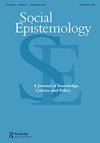二元性语法缺陷是多种认知不公正的综合
IF 2
2区 哲学
Q1 HISTORY & PHILOSOPHY OF SCIENCE
引用次数: 0
摘要
摘要本文描述了一种现象,我称之为“二元主义语法缺陷”(BGL)。BGL发生在非二元性别和性别身份由于性别/性别二元性而被迫根据语言语法在作为他或她之间做出选择时。尽管解释学不公正(HI)是其核心,但鉴于非二元群体提出了克服不公正的解释学手段,并且这些工具不可信,除了HI之外,各种认识上的不公正在BGL中交织在一起。我处理贡献不公正、务实能力不公正、证明不公正和证明窒息。第一节介绍了这一现象,将其描绘成一个认识上的不公正现象。第二节通过对主流西班牙语案例的考察,阐明了BGL核心HI的多样性,第三节揭示了HI的主要危害。第4节研究语法、意识形态和语言使用之间的关系,提请注意语法缺陷在日常言语行为中被表演性地重演。第5节探讨了BGL的代理维度,考察了责任。除了解决除了HI之外,BGL中可能交织的一些形式的认识不公正之外,我还将二元语法的非边缘化用户描述为解释学的不适应者。本文章由计算机程序翻译,如有差异,请以英文原文为准。
Binarism Grammatical Lacuna as an Ensemble of Diverse Epistemic Injustices
ABSTRACT This paper characterizes a phenomenon I call ‘binarism grammatical lacuna’ (BGL). BGL occurs when non-binary sex and gender identities are forced to choose between being he or she by the grammar of a language owing to the sex/gender binary. Although hermeneutical injustice (HI) lies at its core, given that non-binary communities come up with hermeneutical devices to overcome unintelligibility and these tools are discredited, a variety of epistemic injustices, besides HI, intertwine in BGL. I address contributory injustice, pragmatic competence injustice, testimonial injustice, and testimonial smothering. Section 1 introduces the phenomenon by portraying it as an ensemble of epistemic injustices. Section 2 elucidates the variety of HI at the core of BGL by examining the case of mainstream Spanish, and section 3 reveals it as producing the primary harm of HI. Section 4 studies the relationship between grammar, ideology, and language use, calling attention to the fact that grammatical lacunae are performatively reenacted in daily speech acts. Section 5 explores the agential dimension of BGL, examining responsibilities. In addition to addressing some of the forms of epistemic injustice that might intertwine in BGL besides HI, I portray non-marginalized users of binary grammar when addressing non-binary people as hermeneutical misfirers.
求助全文
通过发布文献求助,成功后即可免费获取论文全文。
去求助
来源期刊

Social Epistemology
Multiple-
CiteScore
2.60
自引率
17.60%
发文量
60
期刊介绍:
Social Epistemology provides a forum for philosophical and social scientific enquiry that incorporates the work of scholars from a variety of disciplines who share a concern with the production, assessment and validation of knowledge. The journal covers both empirical research into the origination and transmission of knowledge and normative considerations which arise as such research is implemented, serving as a guide for directing contemporary knowledge enterprises. Social Epistemology publishes "exchanges" which are the collective product of several contributors and take the form of critical syntheses, open peer commentaries interviews, applications, provocations, reviews and responses
 求助内容:
求助内容: 应助结果提醒方式:
应助结果提醒方式:


